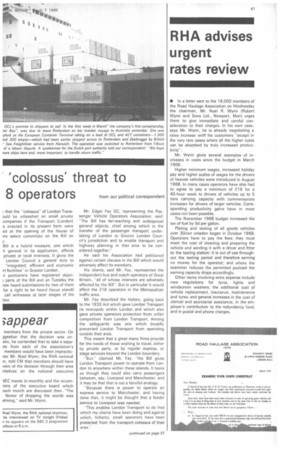R HA advises urgent rates review
Page 43

If you've noticed an error in this article please click here to report it so we can fix it.
II In a letter sent to the 18,000 members of the Road Haulage Association on Wednesday the chairman, Mr. Noel R. Wynn (Robert Wynn and Sons Ltd., Newport, Mon) urges them to give immediate and careful consideration to their charges. In his own case, says Mr. Wynn, he is already negotiating a rates increase witlihis customers "except in the very rare cases where all the higher costs can be absorbed by truly increased productivity".
Mr. Wynn gives several examples of increases in costs since the budget in March 1968.
Higher minimum wages, increased holiday pay and higher scales of wages for the drivers of heavier vehicles were introduced in August 1968. In many cases operators have also had to agree to pay a minimum of €16 for a 40-hour week to drivers of vehicles up to 5 tons carrying capacity with commensurate increases for drivers of larger vehicles. Corresponding productivity gains have in most cases not been possible.
The November 1968 budget increased the tax of fuel by 5d per gallon.
Plating and testing of all goods vehicles over newt unladen began in October 1968. Operators have to pay the fees; they must meet the cost of cleaning and preparing the vehicle and sending it with a driver and fitter to the testing station: it is out of use throughout the testing period and therefore earning no money for the operator; and where the examiner reduces the permitted payload the earning capacity drops accordingly.
Other items involving extra expense include new regulations for tyres, lights and windscreen washers; the additional cost of vehicle replacement, insurance, maintenance and tyres; and general increases in the cost of clerical and secretarial assistance, in the employer's contribution to the redundancy fund, and in postal and phone charges.












































































































































































